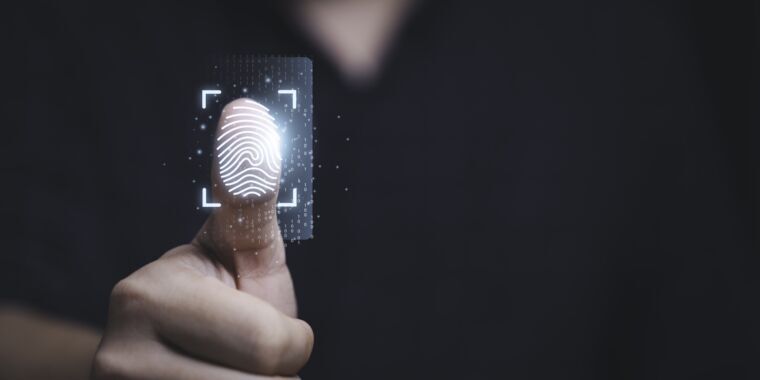- cross-posted to:
- news@lemmy.world
- technology@lemmy.zip
- cross-posted to:
- news@lemmy.world
- technology@lemmy.zip
They can’t force you to cough up a password though.
On iOS, holding the volume up and lock button long enough that the shutdown screens and whatnot start showing, will disable Face ID login and force the PIN to be entered on next unlock.
On android there’s Lockdown mode, so everyone should look into this regardless of what phone you have. Better to look up what to do now rather than when you need it
https://www.zdnet.com/article/how-to-use-the-android-lockdown-mode-and-why-you-should/
I’d like a way to require a pattern outside of predefined locations or WiFi networks. Anyone know of a way?
Lockdown is great but if you fail to put it on then it’s open access for unscrupulous cops.
For almost any phone: just turn it off. Every phone I’ve used requires a passcode after a power cycle
That’s not really related to what I asked though…
Sorry, I misread your comment, I thought you were asking for a method other than one using lockdown mode. I doubt there’s a method using location if it isn’t provided by the manufacturer, because an app trying to do that would need permissions to lock the phone.
You could try one of those automation apps. I remember seeing some triggers for entering and leaving a location, and the advanced ones should be able to use wifi connections/disconnections
Whether it can change security settings though I’m not as sure about.
They can… or could, on rooted phones. Apps like Tasker have a root mode module that can do pretty much anything. Haven’t used it for a while, though.
Running tasker on a unrooted Fairphone 5 There is a function “System Lock” which locks the phone so you have to enter the PIN. I created a task and a widget on the home screen that triggers the task
I did give tasker some extra rights via adb, which is a quite straight forward process. I think the dev even has a guide for it…
Smartlock? You can set trusted locations and devices, that keep your phone unlocked. Otherwise your regular pin/password kicks in
On iOS, hitting vol up, then vol down, then hold power for a second will instantly lock down and also no danger of accidentally calling 911 or whatever.
It’s also the fast way to get to the power option.
Sure but holding volume up and power until the phone vibrates is a much faster and easier method and there is little worry you might accidentally call 911. It’s also easier to do without looking.
It has a countdown before calling with vibrations on every number.
It’s slower, actually.
Are you really trying to argue over ways of locking down the phone?
Yeah I just tested it and you’re right it’s a way faster way to get to power off. Personally prefer the five lock presses as it requires way less dexterity in your pocket. I’ve just disabled the auto-call feature.
For me it’s much easier to lock the phone by holding any volume and power then to remember the sequence needed to force power of the phone.
Clicking 5 times on power is probably faster, but I forgot that existed and if I’m trying to do something quickly essentially squeezing my phone is easier than trying to tap the correct side 5 times quickly under pressure. And much easier to me then trying to remember the force power off sequence and performing it without looking under stress.
Especially on the iPhone 15 pros there is now another button so getting the up down up power means finding the correct up button.
I’ve looked up that sequence numerous times when I’ve needed to force reboot and I still forget it half the time.
Hey cool, good to know. Just tested with my iphone and even though it said “or swipe up for FaceID”, it wouldn’t take my swipe up, and required my PIN to unlock.
Just don’t ever use biometrics for anything.
But then you’ve created dozens (or hundreds) of opportunities a day for someone to get your passcode by shoulder-surfing, which you probably wouldn’t even notice in many situations. I’d argue that unless someone forcibly borrowing your face or fingers to unlock your phone is a strong possibility, entering a passcode each time is less secure than using biometrics.
Especially since the passcode also protects various security settings.Trying to or successfully shutting down will quickly disable it. I don’t think the USA is at the point where we should all worry about arbitrary arrests.
I don’t think the USA is at the point where we should all worry about arbitrary arrests.
“All” may not need to worry, but there are plenty of people who do experience them.
First they came for the socialists, and I did not speak out—
Because I was not a socialist.
Then they came for the trade unionists, and I did not speak out—
Because I was not a trade unionist.
Then they came for the Jews, and I did not speak out—
Because I was not a Jew.
Then they came for me—and there was no one left to speak for me.I don’t think the USA is at the point where we should all worry about arbitrary arrests.
Wrong!
Well, I can confirm from personal experience (me and family) that tourists wanting to enter the US aren’t treated that much differently from criminals.
I’ve resisted them so far 😇
This very reason is why I cut off both thumbs. Can’t force me to unlock my phone with my thumb print now. Checkmate, cops.
I use a mushroom stamp as biometric login.
Can they force you to look at your phone though? Attention aware Face ID requires eyes ball on screen.
And as others have stated, holding volume up and power u til the iPhone vibrates locks the phone requiring the passcode.
Five quick presses of the lock button does this too, but beware as I think the default behaviour also starts a 3 second countdown to calling emergency services.
Pressing the power and a volume button for >2s (the same combination as shutting down the phone) also disables faceID and does not call emergency services.
There’s a setting to disable the call, I just did it that long back I wasn’t sure if that’s still the default.
In Android, holding power and selecting “lockdown” locks out access until your pin is entered. However, if you’re at a protest or something where illegal arrests are likely, turn your phone 100% off.
How is turning it off an improvement over lockdown? I was under the impression that the security impact is basically the same
Location tracking and recording of all activity (voice, text messages). The FBI has admitted doing so during big events like protests.
You don’t turn the phone off, you leave it at home. Unless you are removing the battery, the phone is not completely off.
https://play.google.com/store/apps/details?id=com.merrycachemiss.rl
I found this app that helps to mitigate this issue. It disables fingerprint if your phone gets too far away from a Bluetooth wearable or in several other conditions. It’s worth looking into for sure though it is only in preview for now.
I think it’s an excellent choice for anybody that’s got to wearable. You could probably do all this with past or two if you had the free time, which I do not.
So like it disables then stays disabled until you manually re-activate?
So a confiscated phone goes into lockdown mode?
Yeah. It’s pretty rad. I’ve been playing with it all day.
If I set my watch and airplane mode it also immediately locks the phone, but it also does that when it goes out of range. It looks like the app should work with any Bluetooth device so any wearable should work just fine or even earphones if you really wanted.
This is why multiple factors is important something you are, something you have, something you know.
“Use a
penPIN, Sideshow Bob.”For people who want to use multi-factor to unlock their phone, on Android you can set a unlock code for the work profile. So you can have one factor to unlock the main phone, and one factor to unlock the work profile. So any app in the work profile, like signal messenger, would require you to both put your pin in for one factor, your fingerprint in for another factor.
Some ROMs like graphineos allow you to scramble the pin input pattern, which means the grease on the phone doesn’t give too many clues away as to what your pin is. You get used to it after a day or two
🤖 I’m a bot that provides automatic summaries for articles:
Click here to see the summary
The US Constitution’s Fifth Amendment protection against self-incrimination does not prohibit police officers from forcing a suspect to unlock a phone with a thumbprint scan, a federal appeals court ruled yesterday.
The ruling does not apply to all cases in which biometrics are used to unlock an electronic device but is a significant decision in an unsettled area of the law.
Judges rejected his claim, holding “that the compelled use of Payne’s thumb to unlock his phone (which he had already identified for the officers) required no cognitive exertion, placing it firmly in the same category as a blood draw or fingerprint taken at booking.”
Payne conceded that “the use of biometrics to open an electronic device is akin to providing a physical key to a safe” but argued it is still a testimonial act because it “simultaneously confirm[s] ownership and authentication of its contents,” the court said.
The Supreme Court “held that this was not a testimonial production, reasoning that the signing of the forms related no information about existence, control, or authenticity of the records that the bank could ultimately be forced to produce,” the 9th Circuit said.
The Court held that this act of production was of a fundamentally different kind than that at issue in Doe because it was “unquestionably necessary for respondent to make extensive use of ‘the contents of his own mind’ in identifying the hundreds of documents responsive to the requests in the subpoena.”
Saved 64% of original text.
Removed by mod













